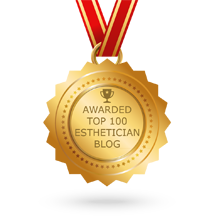As far as anti-aging ingredients go retinol is a superstar. And the great thing about retinol is that it not only fights the effects of aging it also helps clear acne and hyperpigmentation as well.
Retinol refers to the entire Vitamin A molecule and were originally introduced in skincare products 1971 when Retin-A came on the market. When applied topically retinol functions as both an antioxidant and as a cell-communicating ingredient. Being a cell-communicating ingredient means that retinol helps speed up skin cell turnover and helps the skin create healthier skin cells. Retinol also helps the body get rid of dead skin cells. Additionally, retinol has been shown to increase the body’s collagen production which means that when you retinol you will find that your skin is firmer and has an improved texture.
Treating Acne with Prescription Retinols
Since these topical retinoid medications improve the shape and functioning of the pores they very effective in treating acne when used with antibacterial agents because they allow the anti-bacterial agents to reach their target. It is a common misconception that retinoids act like exfoliants – stripping off the top layers of the skin. Instead retinoids are skin cell normalizers. This means that they send-off chemical messengers whose molecules bind to receptors in the nucleus of skin cells in order to change that cell’s behavior. So instead of keratinocytes accumulating and sticking together in the pores the keratinocytes exit the pores in a normal fashion. Unfortunately, while they are extremely effective in treating acne retinoids can be very irritating to the skin. Different retinoid options exist. Retin-A, Renova, Retin-A Micro, Tazorac, and Avita are some of the most popular retinoids available through prescription. These different topical treatments are available in cream and gel form and in different strengths. Exposure to sunlight can degrade the effectiveness of the product so most doctors suggest applying it at night. Another thing to be aware of is that retinoids can be inactivated by benzoyl peroxide so it is important to remember to use these two products at different times of the day. After cleansing the face apply your tretinoin product. Follow with a moisturizer to help prevent irritation and be sure to use a broad spectrum sunscreen during the day.
If you find the above mentioned retinoid products to be too irritating than Differin, the trade name of the synthetic retinoid adapalene, might be a better fit for you since it is considered the least irritating of all the topical retinoids. Women in particular like this product since it can be easily worn under make-up. Differin works in the same way as the other retinoid products already highlighted above but it is neither affected by sunlight or benzoyl peroxide. It is available in cream, gel, and solution form.
Retinols in Anti-Aging Products
There are a few different forms of retinol that you will find in skincare products targeted at anti-aging. The different forms of retinol include:
- Retinoic Acid or Trentinoin. This is a synthetic derivative of Vitamin A, and it is the active ingredient in prescription strength retinoids. Prescription strength retinoids work the fastest since they are already formulated as retinoic acid and they body doesn’t need to convert retinol into retinoic acid. These formulations are strong and can cause irritation, flakiness, and redness. Some doctors suggest using OTC retinols first before using prescription strength retinols so that your skin becomes used to the ingredient. Use it at night, and at first only use it a few times a week so that your skin learns to tolerate the ingredient. You’ll see results in 8 to 12 weeks. Consider trying: Renova, Refissa, or Retin-A.
- Over the counter (OTC) retinol products will contain retinol, retinyl palmitate, reinylaldehyde, or retinyl acetate. To really get your money’s worth you want to buy a product with retinol in it. OTC retinol products work slower than prescription ones because the body needs to convert the retinol into retinoic acid. The upside to using a OTC product as opposed to a prescription one is that you should experience much less or none of the irritation, flakiness, or dryness that you would with a prescription product.
Consider Trying:
- Replenix™ Retinol Plus Smoothing Serum
- Skinceuticals Retinol o.5 or 1.0
- Neova® Retinol ME .30%
- PCA Skin retinol renewal with restorAtive complex
- SkinMedica Retinol Complex
Please note: If you are pregnant or nursing doctors recommend that you do not use any retinol products – prescription or OTC.
Packaging is Important
Retinol is unstable so it is important to make sure that your retinol skincare product is properly packaged. Your product needs to be protected from light so it should come in an aluminum tube or dark glass/plastic package. Don’t buy a retinol product is a clear container. Additionally, in order to maintain its effectiveness the product should be in a tube or pump form.
Sources and Further Reading
-
Revisiting Retinol – The Chicago Tribune February 28, 2010
-
Physiology of the Skin: A New Look at Vitamin A by Peter T. Pugliese, MD from Skin Inc. May 2008
-
Do Retinoids Thin Your Skin? By Dr. Leslie Baumann – May 20, 2010 The Skin Guru Yahoo! Health
-
Vitamin A: Retinol – Paula Begoun
-
New Beauty – Winter Spring 2010, pages 62-69
-
Breaking Out: A Woman’s Guide to Coping with Acne at Any Age by Lydia Preston chapter 6
-
The Beauty Bible, 2nd edition by Paula Begoun pages 242-244



Recent Comments